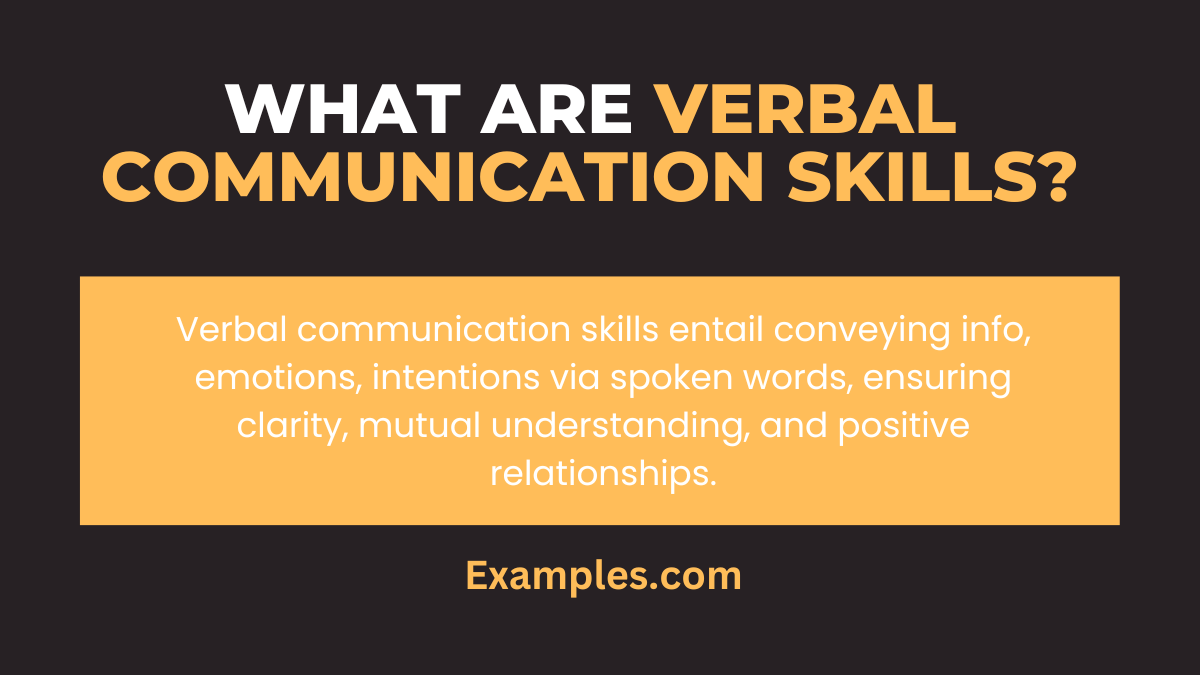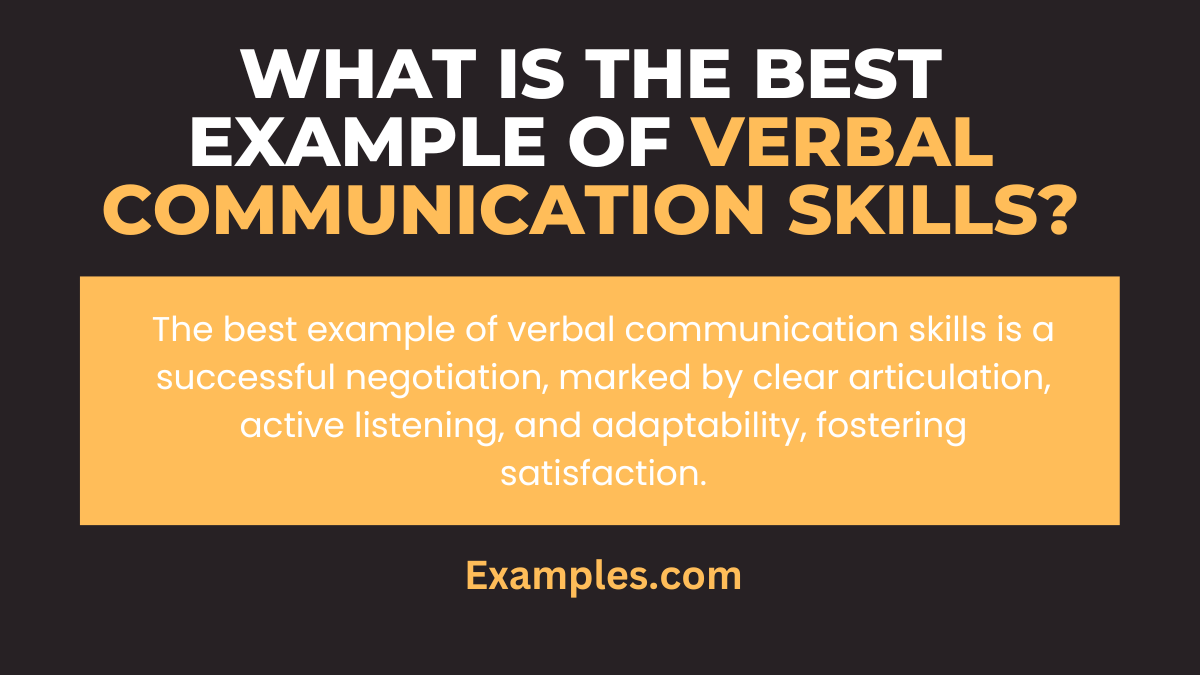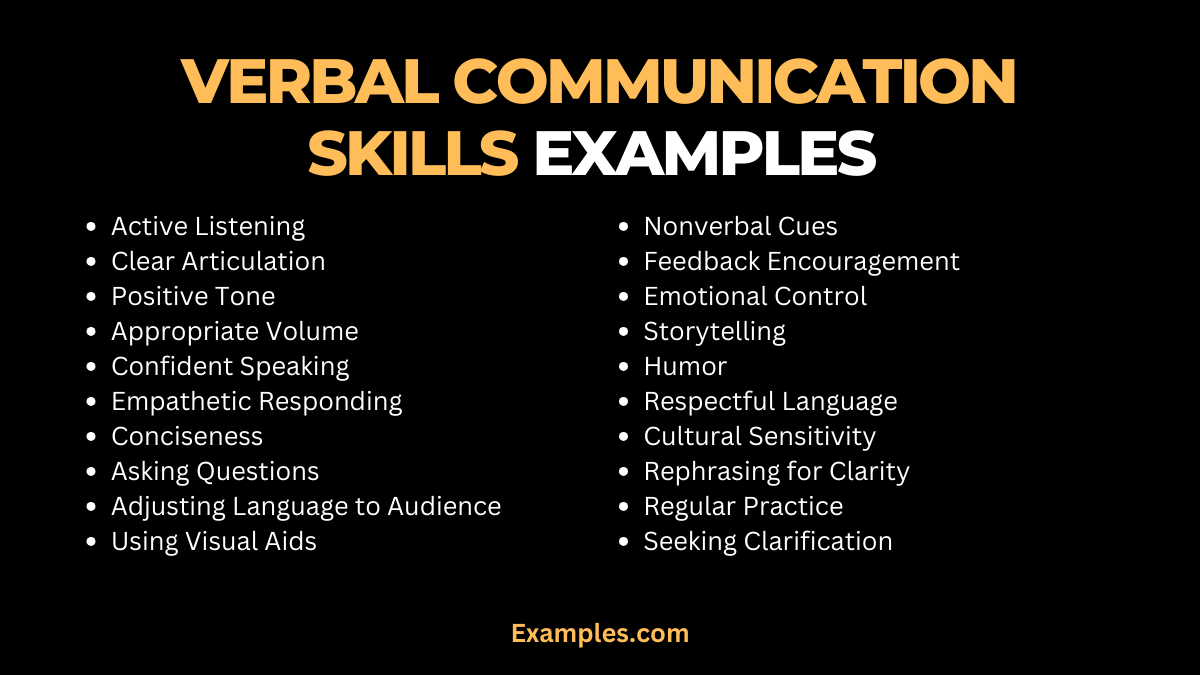19+ Verbal Communication Skills Examples
Explore the world of verbal communication with our comprehensive guide! Delve into practical Communication Examples, tips, and techniques to master verbal interactions. Enhance your personal and professional life by developing articulate, clear, and effective communication skills. Perfect for anyone looking to boost their conversational prowess and understand the nuances of impactful dialogue.
Download How to Improve Verbal Communication Skills in Students With Tips
What are Verbal Communication Skills? – Meaning

Verbal communication skills refer to the ability to convey information, emotions, and intentions through spoken words. It’s the art of delivering messages clearly and effectively. Good verbal communication involves an understanding of the best words to use, the right tone, and the perfect timing to deliver Verbal Communication Examples that resonate with the audience, ensuring mutual understanding and fostering positive relationships.
What is the Best Example of Verbal Communication Skills?

The best example of verbal communication skills can be seen in a successful negotiation where both parties leave satisfied. This involves clear articulation of thoughts, active listening, and adaptability in response. The speaker uses a well-modulated tone, precise language, and positive nonverbal cues like eye contact and nodding, ensuring the message is not only heard but felt and understood, leading to a beneficial outcome for all involved.
20 Verbal Communication Skills Examples

Verbal communication is pivotal in personal and professional settings, forming the core of effective interaction. It’s estimated that a significant What Percent of Communication is Verbal?—highlighting its importance. This comprehensive guide explores Verbal Communication Techniques and the Advantages and Disadvantages of Verbal Communication. Understanding the Functions of Verbal Communication and the various Types of Verbal Communication helps in cultivating strong Verbal Communication Skills. Whether it’s improving rapport in Verbal Communication in the Workplace or enhancing patient care in Verbal Communication in Healthcare, mastering verbal skills is essential. Dive into the Ways to Improve Verbal Communication Skills for a more impactful and articulate expression.
- Active Listening: Essential in understanding messages. Poor listening can lead to misunderstandings. Practice mindful listening to improve.
- Clear Articulation: Being understood is key. Mumbling causes confusion. Work on enunciation and clarity.
- Positive Tone: Tone influences message reception. A negative tone can deter listeners. Adopt a positive, friendly tone.
- Appropriate Volume: Too loud or soft is distracting. Find a balanced volume level for clarity.
- Confident Speaking: Hesitation weakens statements. Build confidence through practice and preparation.
- Empathetic Responding: Shows understanding and care. Lack of empathy leads to disconnect. Enhance by practicing active listening and acknowledging feelings.
- Conciseness: Brevity ensures attention. Rambling loses interest. Practice summarizing thoughts succinctly.
- Asking Questions: Engages and clarifies. Not asking can lead to assumptions. Encourage open-ended questions to foster dialogue.
- Adjusting Language to Audience: Ensures understanding. Inappropriate language can confuse or offend. Tailor your vocabulary and complexity to the listener.
- Using Visual Aids: Enhances understanding. Lack of aids can lead to misinterpretation. Incorporate relevant visuals when explaining complex ideas.
- Nonverbal Cues: Support verbal communication. Inconsistent cues can mislead. Align body language with words.
- Feedback Encouragement: Promotes dialogue. Without feedback, misunderstandings persist. Invite and incorporate feedback regularly.
- Emotional Control: Affects message delivery. High emotion can distort the message. Practice staying calm and composed.
- Storytelling: Engages and connects. Lack of engagement leads to disinterest. Use relevant stories to illustrate points.
- Humor: Lightens and endears. Inappropriate humor can offend. Use wisely to relate and ease tension.
- Respectful Language: Builds rapport. Disrespectful words alienate. Always communicate with respect and consideration.
- Cultural Sensitivity: Acknowledges diversity. Insensitivity can offend or alienate. Understand and respect cultural differences in communication styles.
- Rephrasing for Clarity: Ensures understanding. Confusion arises from complex explanations. Simplify and rephrase dense information.
- Regular Practice: Enhances skill. Lack of practice leads to deterioration. Engage in daily conversation and seek feedback.
- Seeking Clarification: Prevents misunderstandings. Assuming can lead to errors. Always confirm understanding before proceeding.
Verbal Communication Skills for Students
Students thrive with strong Verbal Communication for Students, a skill that bolsters learning, collaboration, and self-expression. Enhancing these skills is crucial for academic success and personal development. It involves clarity, active participation, and respectful dialogue, vital in classrooms and peer interactions. Students engaging in effective verbal communication find it easier to convey their ideas, understand lessons, and build meaningful relationships. These skills are not just academic necessities but life skills, essential in Verbal Communication for School and beyond.
- Participating in Class Discussions: Engage actively in class to better grasp complex topics. “I think the character’s motive was…” shows thoughtful engagement.
- Presenting Assignments: Delivering presentations with confidence and clarity. “Today, I will discuss the causes of…” establishes topic authority.
- Asking Questions: Clarifying doubts promptly for better understanding. “Can you explain how this formula works?” demonstrates inquisitiveness.
- Peer Collaboration: Working effectively in groups by sharing ideas. “Let’s combine our findings and…” encourages teamwork.
- Feedback Expression: Constructively expressing thoughts on peer work. “I enjoyed your presentation, maybe try adding…” offers positive improvement.
Verbal Communication Skills at Work
Effective Verbal Communication in Business is a linchpin of professional success, enabling clear, efficient, and productive interactions. It involves articulating ideas clearly, listening actively, and adapting communication styles to diverse workplace situations. Professionals with adept verbal communication navigate teamwork, leadership, and client relationships more effectively, leading to better outcomes and workplace harmony. These skills are particularly pivotal in Verbal Communication for Teachers, Verbal Communication in Law Enforcement, and more, where clear, impactful communication can make a significant difference.
- Project Briefings: Clearly outlining project goals and roles. “Our objective is to increase efficiency by…” sets clear expectations.
- Conflict Resolution: Addressing issues calmly and constructively. “Let’s discuss this and find a common ground.” promotes resolution.
- Networking: Building professional relationships through engaging dialogue. “I’m interested in your work on…, can you tell more?” opens conversation.
- Client Negotiations: Persuasively discussing terms with clients. “We believe this partnership benefits us by…” articulates mutual benefits.
- Providing Feedback: Offering constructive criticism to colleagues. “I liked how you handled that; perhaps consider…” encourages growth.
Why are Verbal Communication Skills Important?
Why you need Verbal Communication Skills is evident in every aspect of personal and professional life. Verbal communication is foundational for expressing thoughts, engaging in meaningful conversations, and building relationships. Effective verbal skills facilitate clearer understanding, reduce misunderstandings, and enhance interpersonal dynamics. They are crucial in leadership, conflict resolution, and fostering collaboration, making them invaluable in diverse contexts from Verbal vs Written Communication to oral presentations.
- Facilitates Clear Understanding: Ensures your message is conveyed accurately and understood by others.
- Promotes Effective Teamwork: Enhances collaboration and understanding among team members.
- Improves Conflict Resolution: Helps in negotiating solutions and resolving disagreements amicably.
- Enhances Personal Relationships: Strengthens connections through empathetic and open dialogue.
- Boosts Professional Opportunities: Opens doors for career advancement and networking.
How to Improve Verbal Communication Skills?
Improving How to Improve Verbal Communication Skills begins with recognizing their importance in conveying ideas and emotions effectively. Whether it’s Verbal vs Oral Communication, the goal is to be clear, concise, and considerate. Enhancing these skills boosts confidence and competence in various interactions.
- Practice Active Listening: Focus fully on the speaker, understand their message, and respond thoughtfully.
- Expand Vocabulary: A broader vocabulary allows for more precise and varied expression of thoughts.
- Engage in Public Speaking: Regular practice in a safe environment builds confidence and fluency.
- Seek Feedback: Understand how your communication is received and where you can improve.
- Mind Your Nonverbal Cues: Ensure your body language and tone match your words for coherent messaging.
How to Include Verbal Communication Skills in a Job Application
Including Verbal Communication Skills in a job application showcases your ability to interact effectively and is a key asset in many roles. Highlighting these skills can distinguish you in the hiring process, demonstrating your capability in Verbal vs Written Communication.
- Resume Bullet Points: List specific verbal communication achievements or responsibilities in previous roles.
- Cover Letter: Use concise, compelling language to describe your communication strengths and experiences.
- Portfolio or Work Samples: Include presentations, speeches, or projects where your verbal skills were crucial.
- References: Have colleagues or former employers vouch for your communication skills.
- Interview: Demonstrate your verbal skills in real-time by answering questions clearly and engagingly.
What is the Main Advantages of Verbal Communication?
Verbal communication offers several advantages, including clarity, immediacy, and the ability to convey emotions effectively. It fosters understanding, promotes active engagement, and enables quick problem-solving. Communication Training highlights the Importance of Communication in various contexts, enhancing interpersonal relationships, teamwork, and leadership skills, ultimately contributing to personal and professional success.
Why Are Verbal Communication Skills Important in the Workplace?
The Importance of Verbal Communication in the Workplace is critical for teamwork, clarity, and efficiency. Effective verbal skills enhance understanding, collaboration, and problem-solving among employees.
Are there Specific Verbal Communication Skills that are Crucial for Leadership Roles?
Yes, leadership requires clear articulation, active listening, persuasion, and motivational speaking. These skills ensure leaders guide, influence, and inspire teams effectively, abiding by the Rules of Verbal Communication.
In What Ways can Technology be Utilized to Improve and Practice Verbal Communication Skills?
Technology offers platforms like virtual meetings, speech-to-text tools, and communication apps for practicing clarity, conciseness, and coherence, thereby enhancing verbal communication skills in diverse settings.
In conclusion, verbal communication skills are essential in navigating various aspects of life. From understanding its examples and effects to recognizing signs of poor communication and implementing strategies to improve, mastering verbal communication is key to personal and professional success. Embrace these skills to express yourself clearly, build stronger relationships, and enhance your overall effectiveness in communication.



